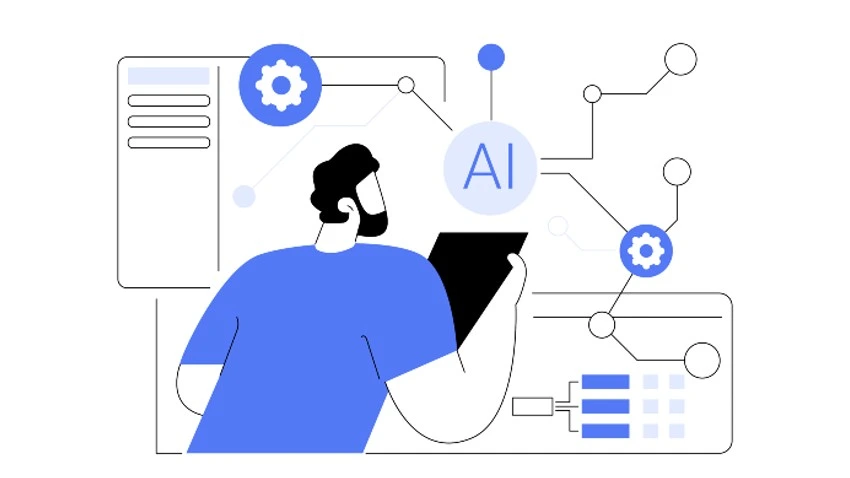In the fast-paced world of mobile application development, speed, efficiency, and quality are paramount. Developers and businesses are constantly seeking ways to accelerate their processes, minimize errors, and deliver exceptional user experiences. Enter intelligent automation, powered by Artificial Intelligence (AI), which is rapidly transforming how mobile apps are designed, built, tested, and deployed. It’s no longer just a buzzword; AI is the silent force behind today’s most successful apps, streamlining workflows and pushing the boundaries of what’s possible.
What is Intelligent Automation in Mobile App Development?
Intelligent automation in mobile app development is the strategic integration of AI, machine learning (ML), and robotic process automation (RPA) to automate complex and repetitive tasks across the entire development lifecycle. Unlike traditional, rules-based automation, AI-driven systems can learn, adapt, and make intelligent decisions, leading to more dynamic and adaptive development processes.
AI’s Impact Across the Mobile App Development Lifecycle:
AI is reshaping every phase of mobile app creation, from the initial concept to post-deployment maintenance:
- Auto Code Generation and Optimization: AI-powered tools are now capable of generating code snippets and optimizing existing code for performance and efficiency. Tools like GitHub Copilot translate natural language into functional code, drastically reducing the time spent on repetitive coding tasks and improving overall code quality. This translates to accelerated timelines and more scalable app architectures from day one.
- Enhanced Code Quality and Review: AI-based code review tools are becoming indispensable. They maintain coding standards, spot logical inconsistencies, detect anti-patterns, and suggest improvements in real-time. This not only fosters better collaboration within development teams but also ensures a cleaner, more reliable final product.
- Proactive Error Detection and Handling: AI algorithms can now detect both hard and “soft” errors (issues that degrade user experience without crashing the app) even before the code reaches production. Machine learning models predict which parts of the application are prone to breakage, enabling proactive error handling and significantly improving app reliability and user satisfaction.
- Real-Time User Feedback Loops: AI can collect and interpret user behavior data in real-time, providing invaluable insights into what features users love, what confuses them, and what needs improvement. This data-driven approach removes the guesswork from UX design, allowing developers to create apps that continuously learn and evolve based on actual user habits.
- Smarter DevOps and Deployment: AI significantly enhances DevOps by automating tasks within CI/CD pipelines. It can predict deployment failures, optimize infrastructure usage, and even recommend the best time for app releases based on traffic data. This leads to fewer downtimes and smoother, more efficient rollouts.
- Fortified Security: Beyond functionality, AI plays a vital role in mobile app security. It helps in detecting anomalies in user behavior, preventing data leaks by identifying suspicious access patterns, and even auto-patching vulnerabilities through machine learning. Biometric-based authentication mechanisms are also enhanced by AI, critical for sensitive applications like fintech and healthcare.
Key Benefits of AI-Powered Automation:
The integration of intelligent automation into mobile app workflows offers a multitude of benefits:
- Increased Efficiency and Productivity: By automating repetitive and mundane tasks, AI frees up developers to focus on more strategic, creative, and high-value activities. This leads to faster development cycles and quicker time-to-market.
- Reduced Costs: Automating tasks minimizes manual intervention, leading to significant reductions in labor costs and error-related expenses.
- Enhanced Accuracy and Quality: AI-driven processes are less prone to human error, resulting in more consistent and higher-quality applications.
- Improved Scalability: AI-powered workflows can easily scale to handle increased demands without requiring proportional increases in resources, making them highly adaptable to growth.
- Personalized User Experiences: AI enables hyper-personalization by analyzing user data and behavior, allowing apps to tailor content, recommendations, and interfaces, leading to higher user satisfaction and engagement.
- Faster Decision-Making: Real-time data analysis and predictive modeling by AI empower faster, more informed decision-making throughout the development process.
The Future is Intelligent:
The rise of intelligent automation is not just a trend; it’s a fundamental shift in how mobile apps are built and experienced. As AI continues to evolve, we can expect even more sophisticated functionalities:
- Hyper-personalized workflows: AI will personalize development workflows based on individual developer needs, increasing engagement and productivity.
- Predictive workflow optimization: Systems will anticipate disruptions and bottlenecks in the development pipeline before they occur, allowing for proactive adjustments.
- More advanced conversational AI: Natural Language Processing (NLP) advancements will lead to even more intuitive and powerful AI assistants within development environments, simplifying complex tasks through natural language commands.
- Seamless integration with emerging technologies: AI in mobile apps will seamlessly integrate with IoT, AR, and VR, creating even more immersive and interconnected user environments.
The journey into this smart, user-centered app landscape is just beginning. By embracing intelligent automation, mobile app development teams can push boundaries, unlock new possibilities, and create applications that are not just tools, but intuitive companions that understand and adapt to our needs. The future of mobile apps is undoubtedly intelligent, and the possibilities are as vast as our imaginations.


